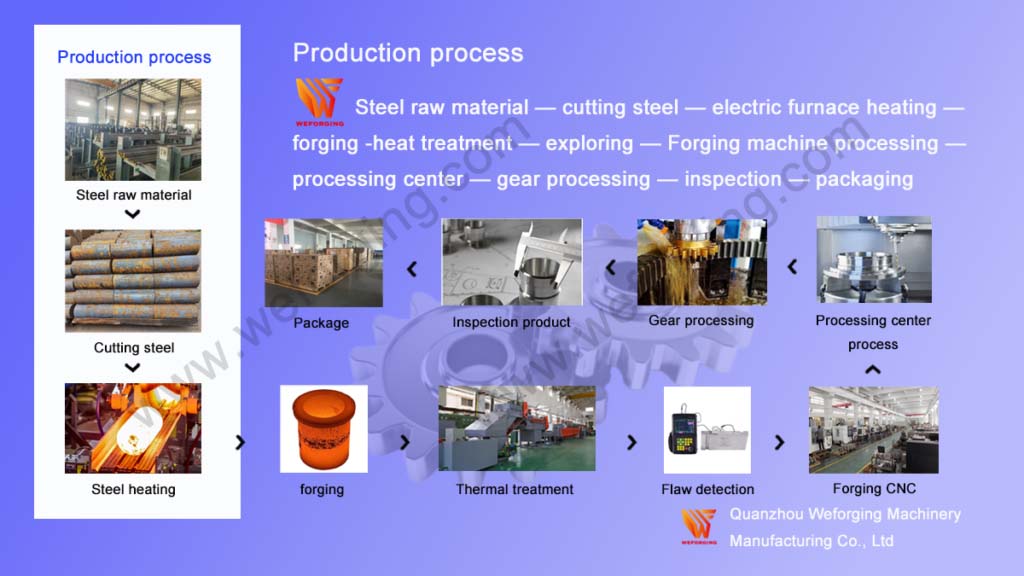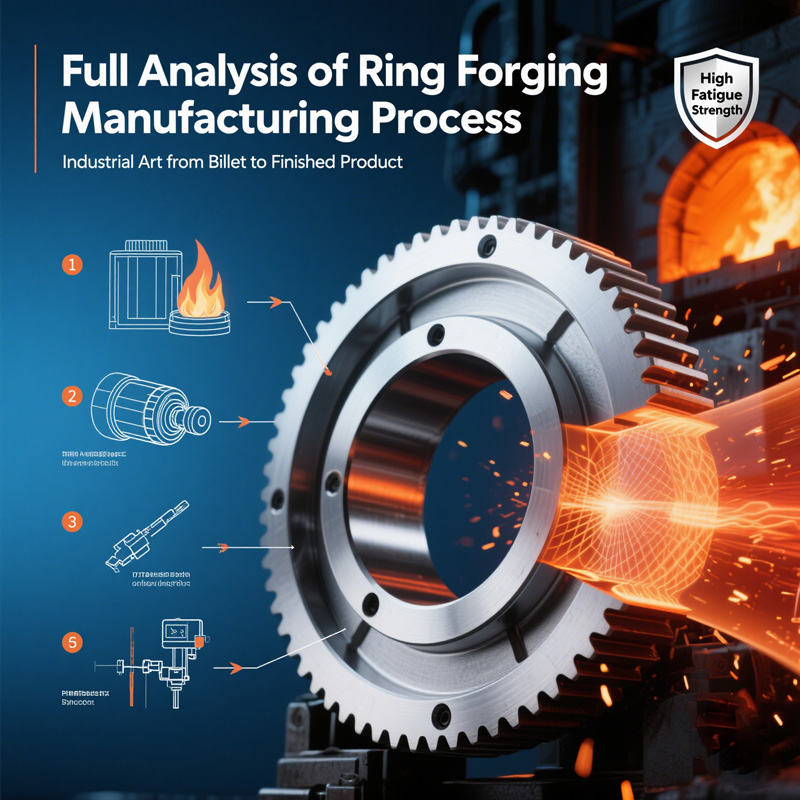Rolled Ring Forgings: A Comprehensive Analysis of Process, Materials and Applications
1. What is a rolled ring forging?
Rolled Ring Forgings are seamless ring-shaped components produced through a special ring rolling process, featuring excellent mechanical properties and structural integrity. Compared with traditional casting or machining methods, rolled ring forgings have significant advantages in terms of strength, reliability and material utilization rate.
Ii. Detailed Explanation of Ring Rolling Forging Process
2. Sawing of raw material bar stock
According to the measurement of the cutting weight and specification size on the drawing, and by selecting the appropriate material, it is precisely cut into certain physical round steel by the cutting machine.
2.2 Upsetting and Punching Forging
The billet undergoes initial forging under high-temperature heating in an electric furnace, initially forming a ring-shaped, cake-like protruding rough billet.
2.3 Perforation Processing
The hydraulic forging equipment is used to punch holes in the middle of the rough billet to form a “donut” -shaped initial billet, which is convenient for the subsequent process of threading the shaft.

2.4 Ring rolling forming
The initial billet is sent into the ring rolling mill. Through a specific die combination, under the action of radial and axial rolling forces, the metal flows along the circumferential direction, the diameter gradually increases, the wall thickness decreases, and the height is maintained or adjusted at the same time.
2.5 Rough machining of forging billets
The ring forgings should be roughly machined first to remove defective products and oxide scale, which is more conducive to the uniformity of the microstructure during heat treatment.
2.6 Heat Treatment
The ring parts after rough machining undergo precisely controlled heat treatment processes to obtain the required metal structure and mechanical properties.
2.7 Finishing
Finally, processes such as machining, gear shaping, gear hobbing and surface treatment are carried out to meet the final size and surface quality requirements.
Iii. Metal Materials for ring forging in rolling

Ring forgings in rolling plants, various metal materials and application scopes:
3.1 Carbon steel and alloy steel:
such as SAME 4140, 4340, etc., suitable for applications with high strength requirements
3.2 Stainless steel:
including austenitic stainless steels such as 304 and 316, as well as duplex stainless steels, it is suitable for corrosion-resistant fields
3.3 Superalloys:
such as 718, 625, etc., used in extreme environments
3.4 Aluminum alloy:
Used in situations where lightweight is required
3.5 Titanium alloy:
Suitable for aerospace and medical field
3.6 Copper alloy:
Used for special electrical conductivity or corrosion resistance requirements
Iv. Industry Applications of Rolled Ring Forgings
Rolled ring forgings are widely used in: Due to their excellent performance
4.1 Ships:
Internal gears, gear rings, flanges
4.2 Energy and Power:
Wind power slewing bearing rings, nuclear reactor components, gas turbine rings
4.3 Petrochemical industry:
Flanges, valve bodies, pressure vessel reinforcing rings
4.4 Heavy Machinery:
Slewing bearings for excavators, large bearing rings for mining equipment
4.5 Transportation:
High-speed rail wheels
4.6 Industrial equipment:
Large gear blanks, key components of mechanical transmission systems
Core Advantages of Rolled Ring Forgings
5.1 Excellent mechanical properties:
The metal flow lines are complete, and its strength and toughness are far superior to those of castings
5.2 High material utilization rate:
The near-net forming process reduces material waste
5.3 Wide range of sizes:
We can produce products with diameters ranging from a few centimeters to over 10 meters
5.4 Structural integrity:
Seamless ring-shaped structure with no welding weaknesses
5.5 Cost-effectiveness:
The cost advantage is obvious when produced in large quantities
5.6 Design flexibility:
It can produce rings with complex cross-sectional profiles
5.7 Stable quality:
Strong process controllability and high product consistency
Vi. Why Choose our Rolling Ring Forging Service?
As a professional forging manufacturer, we offer:
With 40 years of experience in ring forging production, our technical team is professional and reliable
We have a complete range of forging and ring rolling equipment with strong applicability
The integration of forging, heat treatment and machining ensures the traceability of the products and the reliability of their quality
A perfect quality control system and multiple certifications such as ISO 9001 have been obtained
A full-process solution from design support to after-sales service
Competitive prices and on-time delivery guarantees
Consult our ring forging experts immediately:

